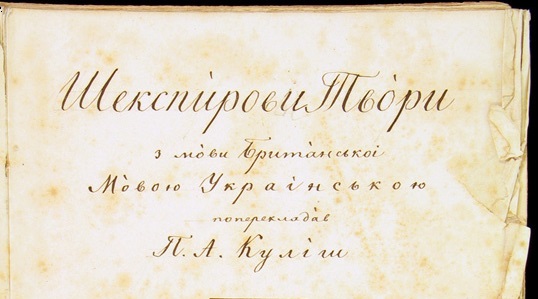Panteleimon Kulish
Another trend of Ukrainian translation – “folklore”, or “experimental” one, – was founded by the ambitious Ukrainian linguist Panteleimon Kulish (1819-1897).
Kulish knew almost all Slavic languages, as well as French, English, German, Spanish, Latin, Swedish, and Hebrew.
The writer believed that translations of masterpieces of world literature would become a source of spiritual enrichment for Ukrainians. Through his translations, he sought to Europeanize Ukrainian literature.
The lexicon of Kulish’s translations is saturated with Old Church Slavonicisms, bringing his works “closer to the people”. He was both praised and criticized for this.
Kulish translated William Shakespeare, Goethe, Lord Byron, Adam Mickiewicz, and Friedrich Schiller, as well as Russian authors Alexander Pushkin, Afanasy Fet, and Nikolai Nekrasov.
Kulish is the first person to have translated the entire Bible into modern Ukrainian. He worked for almost half a century on this translation: he began translating in 1860, having teamed up with the prose writer Ivan Nechui-Levytsky and the physicist and publicist Ivan Puliui. The translation was then published in 1881 in Lviv.
Kulish’s work is often called a true feat, as he kept translating during the time of the Ems Decree, which banned the Ukrainian language.
Mykola Zerov
Another outstanding name in Ukrainian poetry and translation is Mykola Zerov (1890-1937), who is referred to as the patron of Ukrainian translation.
Mykola Zerov translated from Belarusian, Polish, Russian, Italian, French, and most of all –Latin. He translated Horace, Virgil, Lucretius, Ovid, Catullus, Juvenal, and Namatianus.
His complete translation of Virgil’s Aeneid is considered to be his greatest work, but its fate, unfortunately, remains unknown.
Remarkably, Zerov was a master of the sonnet, and therefore he translated a lot of sonnets by foreign poets. His heritage includes translations from Charles Baudelaire, Francesco Petrarch, Pierre de Ronsard, Joachim du Bellay, José-Maria de Heredia, and Adam Mickiewicz.
A separate focus in Zerov’s work is the translation of Slavic literature: from Polish, Russian, and Belarusian. Here, the translation of the Polish tragedy Mazeppa by Juljusz Slowacki, written for the stage, enjoys pride of place.
Zerov translated from Russian the poetry by Mikhail Lermontov, Valery Bryusov, Ivan Bunin, Mykola Gogol, and Anton Chekhov. In particular, he translated into Ukrainian from Russian the novel Ohnennyi Zmii (The Fiery Serpent) written by his above-mentioned colleague Panteleimon Kulish.
The writer compiled his views on translation in a number of theoretical and critical works. In 1932, he began to teach a course on methods and techniques of translation at the Ukrainian Institute of Linguistic Education.

 Українська
Українська Русский
Русский



















 Анна викладає англійську вже три роки, працюючи з учнями різних вікових категорій на індивідуальних та групових заняттях. Здобувши ступінь бакалавра з психології у Львівському національному університеті, Анна завжди прагне знайти індивідуальний підхід до кожного студента, мотивуючи і допомагаючи їм справлятися з труднощами. Вдосконаливши своє знання англійської мови в Великобританії, важливим аспектом в своїй роботі вважає обмін викладацьким досвідом з носіями мови.
Анна викладає англійську вже три роки, працюючи з учнями різних вікових категорій на індивідуальних та групових заняттях. Здобувши ступінь бакалавра з психології у Львівському національному університеті, Анна завжди прагне знайти індивідуальний підхід до кожного студента, мотивуючи і допомагаючи їм справлятися з труднощами. Вдосконаливши своє знання англійської мови в Великобританії, важливим аспектом в своїй роботі вважає обмін викладацьким досвідом з носіями мови.